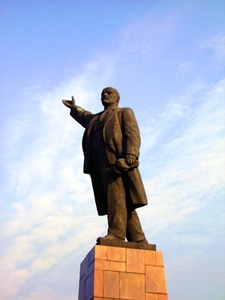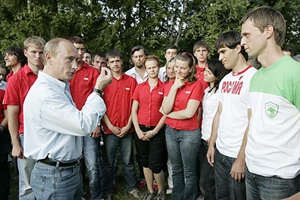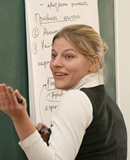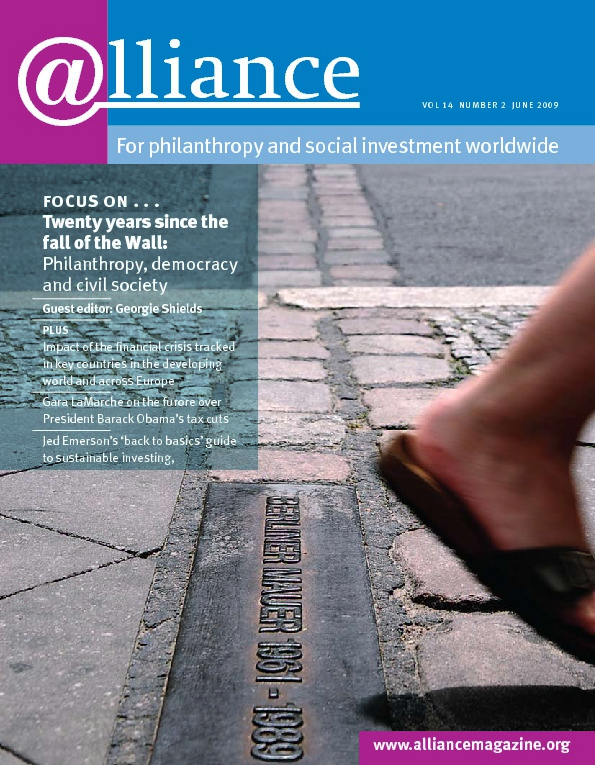When I was 15 in the sleepy city of Krasnodar in southern Russia, I led a double life. By day, I was a ‘model’ teenager with good grades and a member of the school Komsomol (Youth Communist League) committee. At night, I listened to forbidden hard rock and worshipped Black Sabbath, not Lenin. Why mention this: surely, 20 years on from the fall of the Berlin Wall, that ritual of official ideology and concealed real interests is long gone?
For those 20 years, my colleagues in CAF Russia and I have been trying to build civil society in Russia. First, we did it with the support of numerous international donors, then with donations from Russian philanthropists we discovered and nurtured despite doubts and ironic smiles from many Russia ‘experts’. I should be celebrating today, recalling early NGO capacity-building seminars in Siberia, how our first corporate social responsibility roundtable in 1997 seemed an almost total failure but was the start of a new era of Russian CSR, or raising the first million dollars from Russian donors by 2000. But for some reason I remember the Soviet Union’s double standards and double lives; for everyone and in everything, a time of dominant public ideology, privately ignored.
Russia today is a curious mix of autocracy and democracy in which a reasonably large non-profit sector exists alongside a totally non-transparent, seriously corrupt and largely appointed, unelected government; a free market economy on the level of small and medium size enterprises rubs shoulders with big companies either fully nationalized or under severe state control; and almost unlimited freedom of the internet coexists with a gagged press, TV and radio.
For most of those 20 years, especially the first ten, Russia received millions of dollars in foreign aid, a significant portion of which went to ‘democracy development’ programmes. CAF Russia and I were part of that process. We and many other NGOs wrote proposals, filled in endless forms, and talked about democracy. What has been the return on this investment? Why, after years of programmes and projects, capacity-building seminars and conferences, study visits and publications, do we see in Russia such a curious form of democracy? And why do Russians, of their own free will, tend to choose autocratic measures and approaches to governance, selecting Joseph Stalin as the most prominent person in Russian history in a recent national poll, rather than embracing the wonderful Western ideas with which they have been saturated for years by international agencies?
In the field of civil society, not democracy overall, I see four reasons why international democracy and civil society building programmes have so far largely failed to ingrain in Russian citizens the values of independent opinion, an ability for civic, non-violent action, and a habit of self-organizing to solve community problems.
 Lessons of history
Lessons of history
International aid and development agencies failed to recognize the unique position Russia occupied and continues to occupy in the whole post-communist world. Unlike the majority of countries in the region, it was not only a victim of the communist nightmare, it was the source of it. In order to denounce communism, Russia and Russian people in practice need to denounce themselves, 80 years of their history and 80 years of real achievements connected with communist rule. Communism was not imported into Russia, it was a result of Russia’s own search for social justice, a beacon to show the way out of the misery of rampant rural poverty at the beginning of the 20th century and the destruction of the First World War.
Communism’s core role in the country’s history was totally overlooked by the various agencies and foundations that focused on building civil society in Russia as an alternative to the past. They presented civil society as a brush to completely cover with fresh paint nearly a century of history. The same approach was taken across the region, from Central Europe to Russia. This ‘rewriting’ strategy was doomed to fail.
Nobody, for example, ever properly analysed the motives of people who volunteered as Komsomol members (genuinely volunteered, not under threat, as I can say from personal experience), or joined the ranks of ‘Timur’ social volunteering groups, and other forms of community organizing of the Soviet era. In the late 1990s, I nearly buried CAF Russia’s chances to ever win international aid agency grants when I suggested at one strategy review meeting that we needed to research the achievements and failures of the Pioneer organization (the Soviet version of the Scouts) to better understand the historic traditions and motivations of Russian people in community support.
Offering another ideology
Civil society and democracy were presented as a form of ideology. Democracy development focused specifically on political democracy, on formal institutions such as elections, while civil society building focused only on formally registered NGOs without attention to grassroots groups or any real interest in local culture and why society was organized in the way it had been for centuries. Democracy development took on the very familiar face of an externally imposed ideology, exploiting the same notions as communism – a neat explanation of the world, simple rules of the game, happiness promised thereafter – merely with different words. And just as the general public refused to completely condemn the past for the sake of the mysterious ‘civil society’, the Russian elites who initially embraced democracy and civil society grew wary of aggressive ideological pressure and fled the familiar signs of brainwashing in the approach of ‘democracy building’ programmes.
Unrepresentative elites
Development agencies and foundations concentrated their efforts on a tiny part of a much wider non-profit sector, a group of like-minded people, registered NGOs, whose well-educated leaders spoke English and shared the same views as Western agencies but who were – apologies for quoting Lenin – extremely ‘far from the people’. This slice of the sector is mostly very apolitical, largely focused on its own survival, and at the moment all too willing to collaborate with the authorities. It is not representative of society; in fact, society at large does not even know that it exists. Many aid agencies were so focused on increasing the number of registered NGOs that they did not really care what these NGOs did as long as they existed (and dutifully attended capacity-building seminars).
Just as the aristocratic Decembrists, who attempted a coup against Tsar Nicholas I in 1825, tried to impose their view of the world on the Russian public and then, ignored and humiliated, withdrew to discuss democracy in their own tiny communities, so the Russian ‘democracy and civil society elite’ (me included) were removed from society. However, a very different civil society emerged in Russia, a civil society of single mothers with disabled children, unemployed arms factory workers, war veterans’ associations and others. These organizations did not talk about democracy and civil society, nor did they speak English, but they were the very fabric of real Russian civil society: self-organizing communities who helped themselves and others in their struggles for survival. I am proud that CAF Russia was one of then very few international foundations that reached out to the grassroots of this not very ‘textbook-like’ civil society, nurturing the first rehabilitation centres for children with Down’s syndrome based in old communal flats, and the first associations of lonely ‘babushkas’ (old ladies) who got together to overcome the hardships of ageing in their ever-reforming country.
Western donor dependency
Finally, in probably one of the most important mistakes of the ‘democracy development’ era, none of the international foundations and agencies, with a very few exceptions, paid any attention in the 1990s to the growth of Russian philanthropy and development of a domestic funding base for civil society organizations. Many Russian civil society organizations got used to generous foreign grants. When foreign foundations, disillusioned by Russian democracy’s lack of progress, left the country, those organizations found themselves nearly bankrupt. Many closed or significantly reduced their activities, while some – and this is the most fascinating – quickly changed colours to serve the needs of those who would pay, from political consultants to the Kremlin.
Searching for civil society
We should now review and learn the lessons of the assumptions on which international democracy development and civil society funding to Russia was built, from the supposed lack of civil society before 1989 to the wholesale condemnation of all things Soviet, and from offering democracy as an ideological ‘magic pill’ to the creation of a new civil society elite that won almost no domestic support and laid itself open to accusations of being a foreign-funded ‘fifth column’ aimed at destroying Russia.
Today, Western aid has all but disappeared from Russia. International agencies have either given up on the country or been forced to leave by the new government, full of hurt national pride. The Russian philanthropy that has grown exponentially in the past ten years does not support ‘traditional’ civil society, such as human rights groups, advocacy organizations or associations for free media. Many of the new private foundations and corporate donors follow popular tastes, avoiding NGOs to support ‘pop’ philanthropy by helping individuals in need, orphanages and other causes widely supported by the general public for their ‘honesty’ without any attention to the impact or effectiveness of such funding. Other Russian private donors repeat the Western mistake of supporting elites, though this time in the intellectual, scientific or business fields, with no attempt to bridge the gap between these select few and a public struggling under mounting social problems.
For their part, Russian civil society organizations are failing to gain support from either domestic or foreign donors. Despite carefully following the guidelines of Western foundations and agencies rather than the needs of their country, and focusing on familiar democracy development programmes, some leading Russian NGOs are losing international support from funders weary of pouring funds into hopeless projects, yet not attracting crucial financial backing from the Russian general public.
 Watching Russia from a distance, international agencies might be amazed that the public is creating a new alternative civil society. It lives largely on the web in hundreds of horizontally linked non-registered associations of people, who may be initially brought together by trivial interests, such as old cars or new music, but are increasingly moving into the civic action space, expressing their views and trying to formulate policy. Philanthropic giving by millions of Russians may favour ‘pop’ causes, whether hospitals or orphanages, but this reflects an urge in Russian society to participate, express concern and take action. International agencies dreamed about such a reaction but now it is happening, they do not seem to know what to do with it.
Watching Russia from a distance, international agencies might be amazed that the public is creating a new alternative civil society. It lives largely on the web in hundreds of horizontally linked non-registered associations of people, who may be initially brought together by trivial interests, such as old cars or new music, but are increasingly moving into the civic action space, expressing their views and trying to formulate policy. Philanthropic giving by millions of Russians may favour ‘pop’ causes, whether hospitals or orphanages, but this reflects an urge in Russian society to participate, express concern and take action. International agencies dreamed about such a reaction but now it is happening, they do not seem to know what to do with it.
Russian civil society today exists in several universes. One, vertically organized, incorporates such Kremlin-inspired movements as the Nashi or ‘Young Guard’, recalling the worst of the Soviet-era Komsomol. Registered advocacy NGOs make up the remnants of a second, struggling to survive against the daily dilemma of sacrificing their ideals or their sustainability. A third reminds me of my teenage self: a new generation of young people, hungry for career success and new ideas, who dutifully wear Nashi T-shirts in the morning but apply for trainee positions in US companies and join web-based civic movements in the afternoon.
Olga Alexeeva is Head of CAF Global Trustees. Email oalexeeva@cafonline.org
 Elizaveta Filippova – What democracy means to me
Elizaveta Filippova – What democracy means to me
Free and fair elections, having a say in what happens in my community and a guaranteed respect for human rights are all connected and impossible without one another. For me, probably, the most important issue is human rights – and not even the freedom of speech, but more daily problems like personal security and having a variety of opportunities. I’m not involved with my local community much and don’t expect my view to change things that bother me – for instance loud renovation of the road in front of my flat at night.
How important are civil society organizations?
Very important. NGOs in Russia have made a huge difference and created opportunities for people to change lives. For instance, young people are very keen on changing the environment and community around them for the better. Some of these activities were institutionalized in the form of NGOs, some weren’t.
What opportunities do you have to participate in your community and your country?
I’ve never really tested it. But my participation in community life doesn’t include politics. Probably if my involvement changes, I’ll find more boundaries. I see that happening to people around me sometimes.
Elizaveta Filippova is a Russian psychologist, trainer and dancer.
Michael Masterovoy – What democracy means to me
Things like free and fair elections, freedom of speech, etc, all these aspects of democracy are interrelated, but for me guaranteeing human rights – freedom of speech, association, travel – makes the most sense.
How important are civil society organizations?
I feel – I hope I’m wrong – that NGOs in Russia are a joke, and that none of them make a difference or has any influence.
What opportunities do you have to participate in your community and your country?
I have a lot of opportunities to take part in community things that aren’t connected to politics, human rights and other issues that are ‘sensitive’ in Russia. Depending on the situation, that can be almost anything.
Michael Masterovoy is a Russian film producer.





Comments (0)